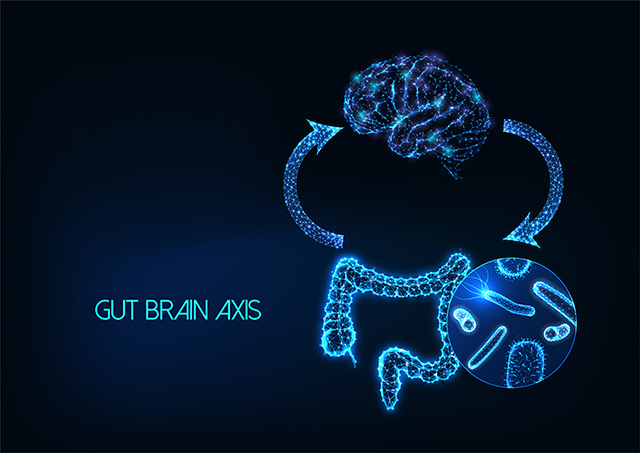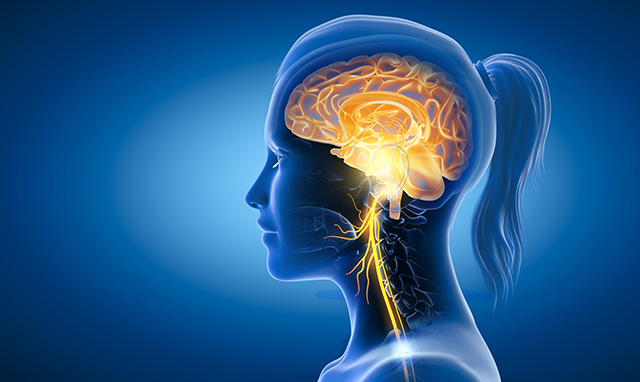Our Gut-Brain
You probably don't think about your gut much. But it is actually your second brain. Did you know that 90% of the body's serotonin is made and stored in the gut? The gut-brain connection (GC) is referred to as "the forgotten nervous system" by some because we already have a well-established central nervous system (CNS). Research has linked nearly every chronic health issue, from digestive problems, to anxiety, migraines and chronic fatigue can be linked back to an imbalanced gut-brain.
My guest for this week’s podcast episode was Demi Fair, a nutritional therapist, Somatic Experiencing Practitioner, and creator of Trust Your Gut. Demi struggled with chronic digestive issues, anxiety, and obsessive thinking from a young age. As a teenager, she began a deep healing journey to explore everything she could to find freedom from her chronic symptoms.
As a teenager, she began a deep healing journey to explore everything she could to find freedom from her chronic symptoms.
This brought her into studying nutrition, gut healing, and a wide variety of healing modalities. While these were extremely helpful, it wasn't until she began to work with her nervous system and body that true, lasting healing began.
“All disease begins in the gut.”
- Hippocrates
In my personal experience, the gut-brain brain connection was not something I was even aware of. Only after breaking my foot and exploring the complications, did I stumble across this important topic. I had no idea how the Vagus Nerve could impact so many things in my body. And I certainly was not aware that it could also become dysregulated. The far reaching consequences of the gut-brain connection and nervous system dysregulation can affect our mental and physical health on such a large scale I am surprised so few people know about it.
What is the gut-brain connection?
The gut-brain connection is a pretty new concept. It's called that because it describes the direct link between our large intestine (which is called the "gut") and our brain. The digestive tract has been referred to as a "second brain" for some time now. But we're now learning more about how this second brain actually works.
The connection between your gut and your brain works through something called the vagus nerve. It runs from your head down through your chest and into both lobes of your lower abdomen—right below where you'd be able to feel if you pressed on it with a finger or two while someone else put their hand on top of yours.

This nerve helps regulate digestion by communicating messages back and forth between these two organs. When we're hungry or stressed out our bodies know how much food they need to eat at once without overeating; when we eat too much they can signal us to stop eating before we become obese; when we're sick they can tell us when those foods aren't good anymore.
We've known about this connection for some time now thanks largely in part due work done earlier in the 20th century by researchers like William Bynum. He found evidence suggesting there might be links between disorders like irritable bowel syndrome (IBS) with certain types of mental distress like depression. While this research didn't come up with any concrete answers back then, there was still enough evidence showing potential connections between the gut and brain.
gut bacteria AND our health
In short, the gut is responsible for many functions in the body that impact our overall health. These include digestion, immune system regulation, weight loss and gain, brain functioning and mood. So when it comes to our guts—and their bacterial inhabitants—it's best to be careful what we put in them.
This is where probiotics come into play. Probiotics are live microorganisms (meaning they are not dead) that have been shown to have a positive effect on human health. The term "probiotic" literally means "for life". These friendly bacteria can help you stay healthy and even alleviate certain ailments when taken regularly as supplements or foods (like yogurt).
The vagus nerve and gut-brain health
The vagus nerve is a cranial nerve that connects the brain to the digestive system. It's part of what's called the parasympathetic nervous system, which controls "rest and digest" functions. The vagus nerve regulates heart rate, blood pressure and breathing. It also activates glands such as salivary glands.
The vagus nerve plays an important role in gut-brain health because it sends information about what’s going on inside your body back to your brain through branches that run down toward your abdomen. This communication allows for an immediate response from your immune system if there is any kind of threat or imbalance in your gut microbiome.

So, what can you do to support your vagus nerve? Complementary health care practitioners have traditionally offered a range of recommendations for supporting the various systems that make up our minds and bodies. These include:
- Meditation and other stress-reduction practices
- Breathing exercises
- Yoga, tai chi and qi gong
- Massage therapy (particularly myofascial release)
- Listening to music or laughter (yes—just listening!)
And finally…being around people you love!
Trauma, Stress, and the Nervous System
The nervous system is the communication network between your brain and body. It allows you to sense, perceive, think and feel things in your environment. Your nervous system consists of two main parts: the central nervous system (CNS) and peripheral nervous system (PNS). The CNS consists of your brain and spinal cord. The PNS includes all other nerves outside of this area including those that control movement.
When we experience stress or trauma, our bodies react by activating a “fight, flight, freeze, or fawn” response. This has been programmed into us since humans first evolved on earth thousands of years ago. Sometimes, our fight-or-flight instinct can become overactive, while suppressing our rest-and-digest instinct. The consequences can include many problems including chronic pain issues, anxiety disorders, PTSD, or depression.

The nervous system becomes unbalanced when it experiences either too much activation or too little activation from any source. This can include physical trauma from physical abuse, surgery or injury. It can also stem from emotional traumas like abuse, loss, or grief. Anything you may perceive as traumatic could potentially dysregulate the nervous system.
If you’re struggling with trauma, there are many ways to retrain your brain so that everyday stress doesn’t trigger a fight-or-flight response. Some of these include:
- Meditation and mindfulness practices
- Yoga or other exercise that helps you feel connected to your body (like dance)
- Breathing exercises, such as the 4-7-8 breathing technique
- Massage therapy or other treatments where you can relax physically and receive touch support from another person
The Takeaway
The gut-brain connection is a fascinating topic that can help us understand how our emotions are linked to our physical health. By looking at how trauma affects the nervous system and learning how to relieve stress, we can improve not only our moods but also our overall quality of life. I hope this article was helpful in giving you some insight into this important connection between the mind and body.
By focusing on a healthy diet, you can reduce your cravings and the amount of stress you experience. Re-aligning the nervous system is another way to improve your overall well-being. And processing trauma can help you deal with past events in a healthier way so they don't resurface and cause more problems.

There's no denying that the gut-brain connection is a major topic in the health and wellness world these days, and it should be. The most common reason people visit their doctors is because of digestive issues and disorders. Many health practitioners are seeing firsthand how gut health affects the rest of our bodies, and they are looking for ways to help their patients improve their gastrointestinal symptoms.
With more people living sedentary lifestyles and eating more processed foods over fresh whole foods, it's logical that more people would struggle with gut issues as well.
The gut-brain connection is a powerful theory based on several important scientific findings. As research has continued, our understanding of this topic has become more and more clear, and we've come to realize just how much it affects our health—both physical and mental.
Now that you are aware of this connection, you can work towards healing your body and mind by making healthy lifestyle choices. Hopefully, this article has provided some good places to start.
